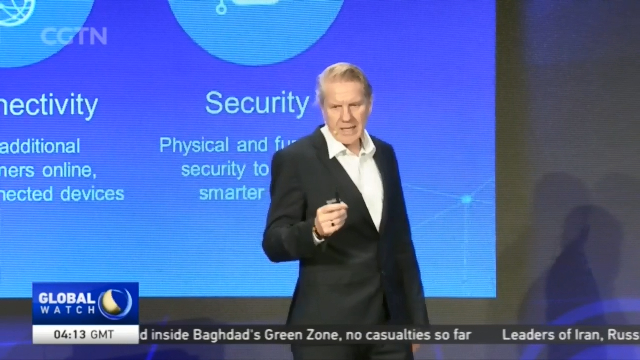
13:14, 07-Sep-2018
China-US Trade Frictions: Dutch chip giant NXP helps cultivate R&D in China
Updated
12:55, 10-Sep-2018
02:41

While the US is trying to hinder China's high-end manufacturing as part of its trade war, Dutch semiconductor giant NXP is doing the opposite. The company aims to expand its cooperation with Chinese clients. CGTN's He Weiwei has more.
China's huge demand of chips attracts giant suppliers. And NXP is one of them. The world's largest supplier of automotive semiconductors has been in business in China for 30 years. It works with major Chinese companies like Baidu, Geely and Xiaomi. But it's not just about selling products to China, but to help with China's own innovation. At a recent tech summit in Shenzhen, the chip giant said it wants Chinese companies to make headway with its own R&D.
STEVE OWENEXECUTIVE VP OF SALES & MARKETING, NXP SEMICONDUCTORS "NXP develops technology in cooperation with Chinese companies. Local companies need to develop their own IP, which they can use inside this market but also then sell the products to the rest of the world. Having developed its own technology will enable Chinese companies to get stronger."
HE WEIWEI SHENZHEN "In mid-August, NXP launched an Applications Development Center for Auto Electronics in Chongqing city, southwestern China. NXP says it will use the center to roll out cutting-edge technology to China, and hire more local innovative personnel.
NXP plans to work with Chinese companies in sectors like the auto industry and artificial intelligence. To NXP and its Chinese clients, the globalization of trade and development is essential.
LARS REGERCHIEF TECHNOLOGY OFFICER, NXP AUTOMOTIVE "There is no such thing like Chinese radio market, there is no German radio market or American market. This is all global solution. The entire automotive market has only 100 million vehicles, chopping it into small initials is a disaster because no one can innovate anymore for localized solutions. So the idea for us is, of course, a globalized world without a lot of trade barriers."
ZHANG YANLUTECH DIRECTOR, XIAOMI INTERNET OF THINGS TEAM "We closely work together with NXP. In our office, sometimes you can't tell whether the engineers are from our company or NXP. We've been trying to catch up in the industry. Now, we have our own applications, and even our own chips. We hope to gain more practical experience and develop our own technology through such cooperation."
According to NXP, over the past three years, the number of its chips R&D personnel in China has increased by 30%.

SITEMAP
Copyright © 2018 CGTN. Beijing ICP prepared NO.16065310-3
Copyright © 2018 CGTN. Beijing ICP prepared NO.16065310-3